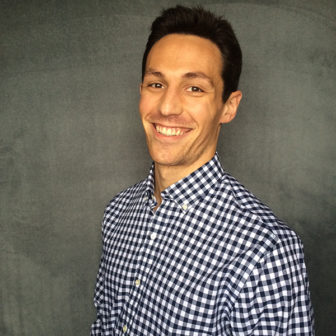
Samuel Zeller/Unsplash
.
Instead of teaching students the content we think they should know, what if students chose the content based on their passions and goals? What if all we did was provide the structure to empower experiential learning and skill development?
My motivation for this question developed from personal experience. I knew in high school that I wanted to be an entrepreneur, but no formal education or programs existed to support that goal.
So instead of diving in to start learning and experiencing entrepreneurship, I was forced to wait, follow the traditional path to college and a job in finance, and then take a huge risk in my mid-20s to start my own company and support myself.

Matthew Moheban
Yes, I know I was fortunate to have the opportunity of a college education and a high-paying job, but that happened because I could “play the game” and do well in school.
How many students, either with unique gifts and talents or with traumatic experiences in their youth, aren’t supported in a traditional learning environment? How many of these students fall by the wayside or settle for a life far short of their potential?
Conversely, what if they could get started on their dream career or entrepreneurial path right now, by acquiring the knowledge, skills and network they need to be successful?
A study from Oxford and Pearson revealed that “the first person who will live to 150 years old has already been born … A child born today in the USA has a 50-50 chance of reaching 104. Some will live much longer. How will we ever prepare someone in 16 years for a 100-year career?”
What does this mean?
Our education and out-of-school time programs must convert students into lifelong learners so that the learning continues well beyond the traditional 12- to 16-year education. We have to teach them to be disciplined in practicing their passions on a daily basis. We have to show them how to build meaningful relationships with peers and seasoned professionals.
Based on researching the psychology, habits and routines of top performers across industries, these are three of the most critical skills students need to land their dream careers, along with ways you can implement this skill-building by spending little to no money.
Learn
“The wisest mind has something yet to learn.” —George Santayana
Learning is an essential part of becoming an expert in a student’s desired field and passions, and I’m not talking about a generalized high school diploma or college degree.
There’s no reason that a student who wants to be an athlete should wait to learn about fundamental and advanced playing techniques, performance psychology and cutting-edge fitness and nutrition. Or for a student who is passionate about comedy delaying their learning about improvisation, storytelling and public speaking.
How else could you explain a then-16-year-old named Flynn McGarry cooking at a pop-up restaurant in New York City that sells out months in advance for $160 per plate? Is it likely he limited his learning to what he was being taught in class or waited until he was old enough to go to culinary school?
Learning about personal development from books, articles and podcasts on a daily basis are what allowed me to start my company in the first place, and how I continue confidently helping students become their best selves.
Learning on a budget
Below are multiple ways students can immediately begin learning about their desired field:
Articles, books and audiobooks:
- Free: Library, Google
- Paid: Kindle, Amazon, Audible
Documentaries:
- Free: Free documentary websites, YouTube
- Paid: Netflix, Amazon, other TV and video service providers
Podcasts:
- Free: iTunes, Spotify, Stitcher
Online courses:
- Free: Khan Academy, university online courses available to the public
- Paid: CreativeLive, Skillshare, MasterClass, Udemy
YouTube and social media:
- Free: Follow YouTube channels and relevant accounts, watch how-to, inspirational and other videos
Practice
“Practice is the best of all instructors.” —Publilius Syrus
Students need to begin acquiring theory and knowledge before they can start effectively practicing their craft, but knowledge can only take them so far.
Practice is where students apply their learning by doing — where they play, write, record, create, speak, interview and get involved on a daily basis.
Twenty-year-old Kylian Mbappe did not wait to dedicate enormous amounts of time practicing on his own until he was asked to play on the French national soccer team. That came well before he was in the spotlight.
The sooner students experience failure and the poor quality of their early efforts (which is unavoidable no matter what age you start something new), the sooner they can acquire fundamental skills and start building advanced skills.
I cringe at the marketing materials I created for my summer camp in college and struggle to read my first blog posts without getting nauseated. But this early practice is what has allowed me to make a living doing what I love every single day.
Practicing on a budget
Students need a mix of public practice in front of groups and independent practice on their own.
For public practice: Join a team, club, after-school or community program. If a student wants a career in soccer, they should try out for the school team and be playing for a team in the offseason. If they want to be a politician, they should join the debate team and take a public speaking course.
For independent practice: Practice three to seven or more times per week on your own. While group practice is critical, practicing only during the scheduled times above is not enough.
Connect
“It’s the people we hardly know, and not our closest friends, who will improve our lives most dramatically” —Meg Jay, author of “The Defining Decade: Why Your Twenties Matter–And How to Make the Most of Them Now”
A person’s network is a huge determinant of their success. “Self-made” is a myth, as the most successful people in their field had mentors, coaches and teams that helped them accelerate their growth and success.
Take Oprah Winfrey, who was mentored by Maya Angelou, or Mark Zuckerberg, who was mentored by Steve Jobs. Not to mention the mentors each of them had before these famous relationships.
I’ve had countless mentors in my life who have helped me learn money management, decide on commercial banking for my first job, accelerate my personal development and do things in business that I couldn’t have imagined on my own.
None of these relationships get created by accident. Students should actively seek out mentors, connect with people in their dream field and ask them for guidance on how to replicate their success.
Connecting on a budget
Here are some ways students can connect with people in their desired field for free:
- Ask for an introduction to your desired person from a parent, coach, teacher or mentor.
- Reach out directly by sending a cold email or making a cold phone call.
- Ask this person out for coffee or lunch.
- Ask this person to come speak at your school, program or organization.
- Job shadow.
- Or for a high-quality, possibly low-cost option, attend a seminar, conference or other kind of event related to their passions.
And finally, here are three different project-based learning ideas to implement this skill-building with your students.
Matthew Moheban is the co-founder of 220 Leadership. 220 provides curricula, courses and training to help every student land their dream job or start their dream company.





























